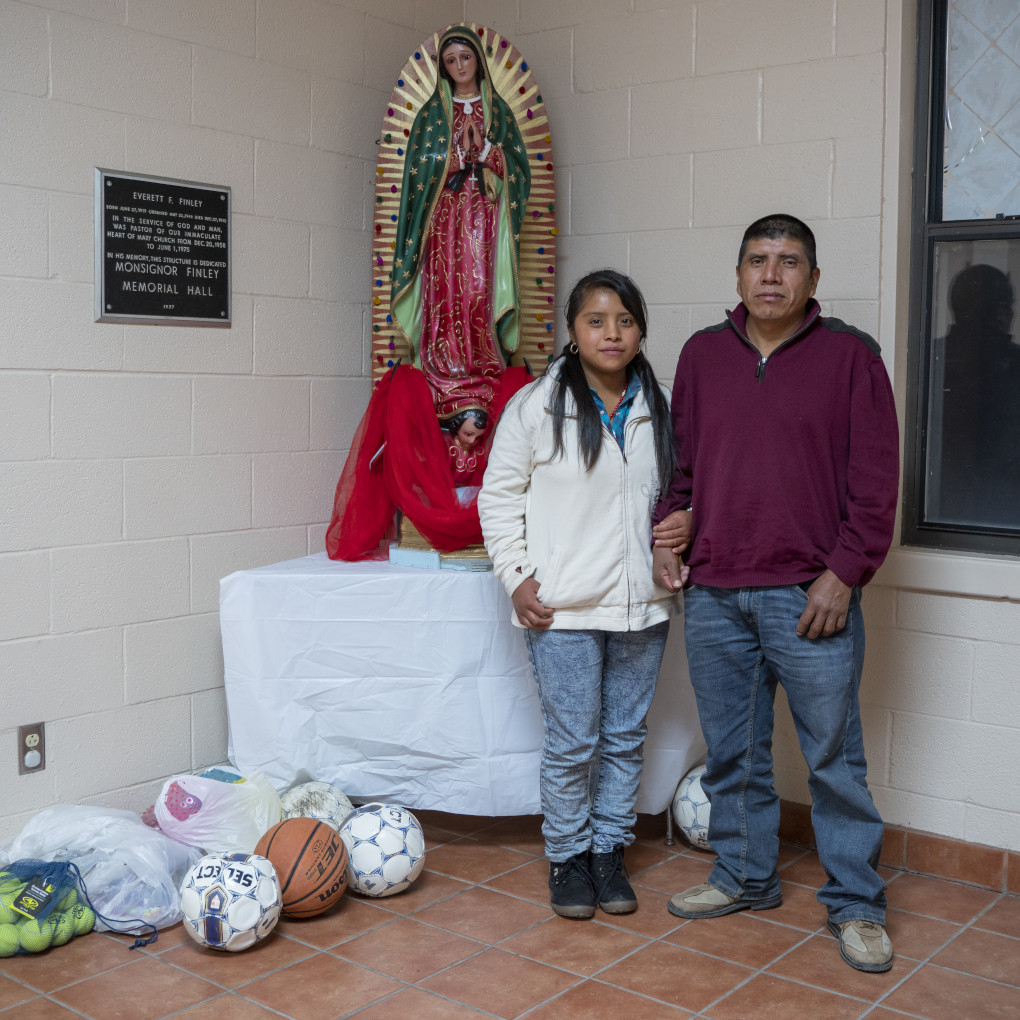Miguel Alonzo, 44, from San Mateo Ixtatán, in the Huehuetenango Department of Guatemala told me, “I love America,” proudly when I first meet him.
Miguel, blames the government of his country for the problems it faces, “Here comes the president of Guatemala, he just puts the money in his pockets,” he said speaking of the dilapidated infrastructure in his town, the poor quality of roads and bridges and the difficulties cultivating crops.
Miguel, a Mayan Chuj, speaks his native tongue with his 17 year-old daughter Anayeli. The two made the long journey together through Mexico paying a coyote, about 30,000 Quetzals ($3200) for their passage. Many such migrants do this for safety, and avoidance of the Mexican authorities. The reason this is so, is because most people in Guatemala cannot get a visa, and therefore cannot depart on a flight to the United States. Despite the steep cost, many prefer this option for the sake of safety.
Anayeli, quiet and shy, does not speak that much Spanish, which Miguel blames on the school system in his mostly indigenous town. Many indigenous children struggle with Spanish, an important tool for participating in Guatemalan society and receiving an education.
“Here there is life,” he said. “If you live there, (Guatemala) there is no where to get money.”
This is the reality for many other Guatemalan families which rely solely on international remittances to pay for daily life.
Coming to the United States was never an easy decision for Miguel. He has spent over seven years apart from his family during his long journey, “Its difficult,” he said, “When I left my country they were small, and when I came back they were all grown up,” he said referring to his kids.
He hopes his daughter will be able to learn some English in school in Tennessee where they would head the following day
Miguel Alonzo, 44, de San Mateo Ixtatan, Departamento de Huehuetenango en Guatemala, me dijo, “Yo amo América,” con orgullo me dijo cuando lo conocí.
Miguel, le echa la culpa al gobierno de su país por los problemas que enfrentan, “Ay viene el Presidente de Guatemala, solo a poner dinero en sus bolsillos,” dijo él, refiriéndose a la infraestructura dilapidada en su pueblo, la baja calidad de las calles y los puentes y las dificultades para cultivar las cosechas.
Miguel, un maya chuj, habla su idioma nativo con su hija Anayeli de 17 años, Los dos hicieron un largo viaje juntos por México, pagandole a un coyote, más o menos 30,000 quetzales ($3,200) para su pasaje. La mayoría de los migrantes hacen esto por seguridad, y para evitar las autoridades Mexicanas. La razón por esto, es porque la mayoría de la gente en Guatemala no puede obtener una visa, y por lo tanto no pueden viajar en avión a Estado Unidos. A pesar del costo tan elevado, muchos prefieren esta opción por el bien de su seguridad.
Anayeli, callada y vergonzosa, no habla mucho Inglés, la cual Miguel culpa el sistema escolar en su pueblo indígena. Muchos niños indígenas batallan con el Español, una herramienta muy importante para la participación en la sociedad de Guatemala y para recibir una educación.
“Aqui ay vida,” dijo el. “Si vives alla, (Guatemala), no hay donde ganar dinero,” Esta es la realidad para muchas familias Guatemaltecas, que solo dependen de remesas internacionales para sobrevivir cada dia.
Venir a Estados Unidos nunca fue una decisión fácil. Miguel ha estado separado de su familia por más de siete anos durante su largo viaje. “Es difícil,” dijo él, “Cuando deje mi país, ellos estaban pequeños, y cuando regrese ya habían crecido,” dijo él, refiriéndose a sus hijos.
Espera que su hija pueda aprender Inglés en la escuela en Tennessee, a dónde se dirigen el siguente dia.
The Faces of Immigration Project is a 40 Day photo journal series used to highlight the stories of all Immigrants. The project is meant to shed light on some of the many reasons people have for immigrating to the U.S. Statements and stories have been edited for content, clarity, and brevity and may not reflect the entirety of an Immigrant’s reasons for immigrating to the United States.
By Paul Ratje

